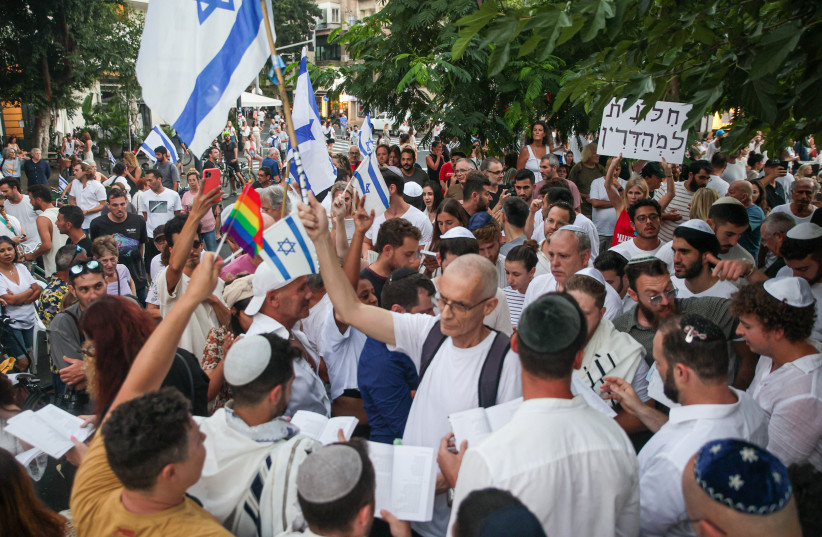The Rosh Yehudi association announced that it will not hold its controversial gender-segregated Yom Kippur service in public, after winning an appeal in the Supreme Court that allowed the organization to hold these services in the public sphere, Walla reported Thursday.
“Unfortunately, we heard plans to ruin this legal prayer,” the organization’s chair told Walla. “We chose the responsible step and to be the ones who are insulted and do not insult, and we will pray in shul on Yom Kippur.”
“During war, when our soldiers are risking themselves in heroic battle, and when the whole nation is praying for the safe return of our hostages, the way to victory and to defeating the enemy and bringing the hostages back is by adding holiness, unity, and internal peace,” he added.
The court’s decision to allow gender-segregated prayer in a public space was part of an appeal against the decision that prohibited how the prayer would be held.
The High Court ruling stated that the Tel Aviv municipality is authorized to make arrangements for the Yom Kippur prayer to separate based on gender using partitions at the request of the appellants.

Responses from organizations and officials
The decision was controversial, with many highlighting the potential damage to women’s rights.
“It starts with [gender] separated prayer in public, continues to the line at the clinic, and becomes girls being sent to the back of the bus,” Israel Women’s Network said on Wednesday.
“The Supreme Court’s decision today to allow separated prayer in public, in complete opposition to its decision from a year ago, legitimizes the phenomenon of exclusion of women that is led by messianic powers that don’t accept the equal place of women in society,” the network added.
Tel Aviv’s mayor, Ron Huldai, told residents to respect the High Court’s decision on the matter. In a statement to X/Twitter, he wrote, “The Municipality of Tel Aviv-Jaffa will respect the decision of the High Court and will allow the prayer in Meir Garden on Yom Kippur. I call on the residents of Tel Aviv to respect the verdict.”
However, he criticized the decision, saying, “The High Court gave a hand to the exclusion of women in the public sphere and thus opened a slippery slope.”
Yesh Atid leader Yair Lapid wrote on X that he would respect the High Court ruling but said, “I call on the liberal public not to give the instigators or the rioters who initiated these prayers the quarrels they want.”
“Don’t go protest because that’s what they want; it’s better to ignore. Let them stay there alone, stuck with themselves.”
National Security Minister Itamar Ben-Gvir also welcomed the High Court’s ruling, writing on X, “The Court’s decision is the most natural, correct, and appropriate decision. The judges did well to put the Tel Aviv municipality in their places.”
The decision for this year’s service followed conflicts at a service last year where tensions were high between those who wanted divided prayers and those who did not want to see division in the public sphere.
Confrontations broke out in Tel Aviv’s Dizengoff Square on Yom Kippur as some congregants tried to set up partitions to separate men and women, which was banned at the time by the Tel Aviv municipality and the High Court because it was a public space.
Some groups petitioned the Tel Aviv courts to overrule the separation ban, but the High Court rejected the petitions.
When the prayer service began, protesters showed up to demonstrate against gender separation, and in some cases, the disagreements devolved into fighting.
Ariella Marsden contributed to this report.
